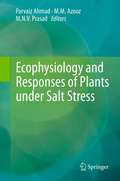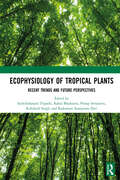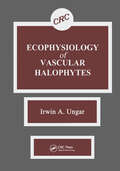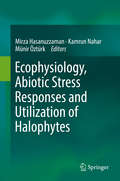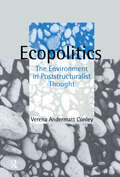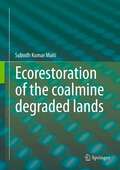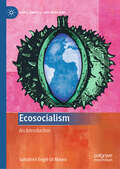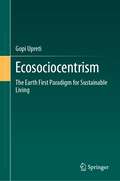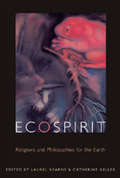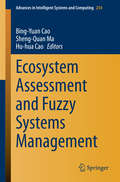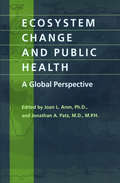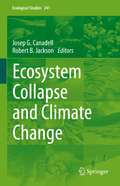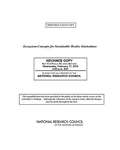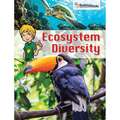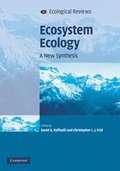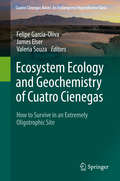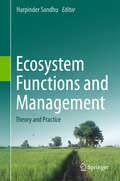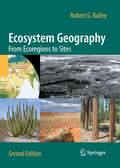- Table View
- List View
Ecophysiology and Biochemistry of Cyanobacteria
by Rajesh Prasad RastogiThis book emphasizes and presents the latest information on eco-physiology and biochemistry of cyanobacteria with special emphasis on their biodiversity, molecular mechanisms of some important biological processes and survival mechanisms under myriad of environmental conditions as well as bioremediation. Cyanobacteria are the most dominant prokaryotic floras on the Earth’s surface, and are of great importance in terms of ecological, economical and evolutionary perspectives. They are oldest groups of photosynthetic autotrophs, which create oxygenic atmosphere for the development and sustainability of ecosystems with different life forms. The book presents an integrative approach to their possible biotechnological application in the field of bio-energy and various aspects of biochemistry, biophysics and structural biology of photosynthesis. The various chapters describe the different applications of cyanobacteria as bio-energy sources and in phycoremediation. The contents incorporated in this book can be used as a textbook by undergraduate and post-graduate students, teachers, and researchers in the most interesting fields of physicochemical ecology and biochemistry of cyanobacteria.
Ecophysiology and Responses of Plants under Salt Stress
by Parvaiz Ahmad M.N.V. Prasad M. M. AzoozThis book will shed light on the effect of salt stress on plants development, proteomics, genomics, genetic engineering, and plant adaptations, among other topics. Understanding the molecular basis will be helpful in developing selection strategies for improving salinity tolerance. The book will cover around 25 chapters with contributors from all over the world.
Ecophysiology of Tropical Plants: Recent Trends and Future Perspectives
by Rishikesh Singh Rahul Bhadouria Sachchidanand Tripathi Pratap Srivastava Rajkumari Sanayaima DeviPlants in tropical regions are coping with enormous challenges of physiological stresses owing to changing environmental and climatic conditions. Rapid growth of human population and rampant exploitation of fossil fuels and other developmental activities are actively contributing to such perturbations. The Intergovernmental Panel on Climate Change has projected a sustained increase in carbon dioxide (CO2) emissions and thereby a rise in global temperature in the coming decades. The resultant changes in precipitation patterns are now evident across the globe due to intensication of hydrological cycle. Moreover, gaseous and particulate pollutants are also an immense challenge for tropical plants. Such vagaries in environmental conditions have signicant impacts on the ecophysiological traits of plants, resulting from altered interactions of tropical plants with each other, as well as other biotic and abiotic components within the ecosystem. Books available in the market that particularly focus on ecophysiological responses of tropical plants to abiotic and biotic environmental factors under climate change are limited. This book intends to fill this knowledge gap and provides a detailed analysis on ecophysiological responses of tropical plants to these environmental challenges, as well as suggesting some approachable measures for plant adaptations to these challenges. The book is equally applicable to undergraduate and postgraduate students, researchers, teachers and forest managers, and policy makers. Salient features of the book are: 1. A comprehensive discussion on adaptive mechanisms of plants through their ecophysiological responses to various biotic and abiotic stresses. 2. Elaboration on the recent techniques involved in ecophysiological research. 3. A detailed account of evolutionary responses of plants to changing climate. 4. Discussion of recent research results and some pointers to future advancements in ecophysiological research. 5. Presentation of information in a way that is accessible for students, researchers, and teachers practicing in plant physiology and ecology.
Ecophysiology of Vascular Halophytes
by Irwin A. UngarEcophysiology of Vascular Halophytes provides a useful update to existing literature describing the ecophysiological responses of vascular halophytes to environmental stresses present in saline habitats. The success of species growing in these extreme environments is related to a number of adaptations, including the timing of phenological events, phenotypic plasticity and genetic selection for specific ecophysiological responses at different stages of development. Factors discussed that influence the growth and distribution of halophytes include seed germination, salinity stress, salt stimulation, flooding, ion content, nitrogen, plant water status, growth regulators, photosynthesis, and genecology. The book also discusses the effects of both interspecific and intraspecific competition on the growth and survival of halophytes. Researchers and students of stress ecology, as well as agricultural research organizations, will find a tremendous store of information in this volume.
Ecophysiology, Abiotic Stress Responses and Utilization of Halophytes
by Münir Öztürk Mirza Hasanuzzaman Kamrun NaharHalophytes are those plant species that can tolerate high salt concentrations. There are diversified species of halophytes suited for growth in various saline regions around the world, e.g. coastal saline soil, soils of mangrove forests, wetlands, marshlands, lands of arid and semiarid regions, and agricultural fields. These plants can be grown in soil and water containing high salt concentrations and unsuitable for conventional crops, and can be good sources of food, fuel, fodder, fiber, essential oils, and medicine. Moreover, halophytes can be exploited as significant and major plant species for the desalination and restoration of saline soils, as well as phytoremediation. This book highlights recent advances in exploring the unique features of halophytes and their potential uses in our changing environment.
Ecopolitics: The Environment in Poststructuralist Thought (Opening Out: Feminism for Today)
by Verena Andermatt ConleyEcopolitics is a study of environmental awareness - or non-awareness - in contemporary French theory. Arguing that it is now impossible not to think in an ecological way, Verena Andermatt Conley traces the roots of today's concern for the environment back to the intellectual climate of the late 50s and 60s.The author considers key texts by influential figures such as Michael Serres, Paul Virilio, Gilles Deleuze and Felix Guattari, Michel de Certeau, Hélène Cixous and Luce Irigaray. Ecopolitics rehabilitates some ecological components of French intellectual thought of the past thirty years, and reassesses French poststructural thinkers who explicitly deal with ecology in their work.
Ecoregional Green Roofs: Theory and Application in the Western USA and Canada (Cities and Nature)
by Bruce DvorakThis book studies the application of green roofs in ecoregions of the western United States and Canada. While green roofs were intended to sustain local or regional vegetation, this volume describes how green roofs in their modern form are typically planted with a low-diversity mix of sedums from Europe or Asia. The authors demonstrate how in the western USA and Canada many green roofs have been designed with native plants and have been found to thrive.Part I of this book covers theory and an overview of ecoregions and their implications for green roofs. In Part II vegetation from prairies, deserts, montane meadows, coastal meadows, and scrub and sub-alpine habitats are explored on seventy-three ecoregional green roofs. Case studies explore design concepts, materials, watering and maintenance, wildlife, plant species, and lessons learned. Part III covers an overview of ecoregional green roofs and a future outlook.This book is aimed at professionals, designers, researchers, students and educators with an interest in green roofs and the preservation of biodiversity.
Ecorestoration of the coalmine degraded lands
by Subodh Kumar MaitiThe book adopts an application-oriented approach for ecorestoration of coalmine degraded. The theoretical aspects of ecorestoration, and steps involved in ecorestoration process and experimental aspects of thorough analytical procedures have been discussed in detail. It emphasizes on the types of mining, land degradation, and biodiversity conservation while giving details of technical and biological steps, topsoil management, selection of plant species, seeding, nursery practices; adoption of innovative approaches like mulching, biofertlizer application, hydroseeding, superabsorbent; use of grass-legume mix; monitoring and aftercare of reclaimed sites; the indicators of sustainable ecorestoration; and Rules and Acts implemented and followed across the world. Best ecorestoration practices, mine closure issues, collection, laboratory analysis and interpretation of minesoil and topsoil samples, monitoring biological parameters, litterfall and tree growth analysis, erosion management, design of drainage and sedimentation retention basin, and brief description of tree species with identifying character for field people are all part of the book. [Message by Prominent Academician] It is now urgent that methods of coal mining be integrated with engineering for ecorestoration because the larger society will not accept devastated waste land. A book, coming out from the hands of one of the persistent researchers of the field, cannot be more timely. Jayanta Bhattacharya, PhD FNAE Professor, Department of Mining Engineering Indian Institute of Technology, Kharagpur-721302, India.
Ecosickness in Contemporary U.S. Fiction
by Heather HouserThe 1970s brought a new understanding of the biological and intellectual impact of environmental crises on human beings, and as efforts to prevent ecological and human degradation aligned, a new literature of sickness emerged. "Ecosickness fiction" imaginatively rethinks the link between ecological and bodily endangerment and uses affect and the sick body to bring readers to environmental consciousness.Tracing the development of ecosickness through a compelling archive of modern U.S. novels and memoirs, this study demonstrates the mode's crucial role in shaping thematic content and formal and affective literary strategies. Examining works by David Foster Wallace, Richard Powers, Leslie Marmon Silko, Marge Piercy, Jan Zita Grover, and David Wojnarowicz, Heather Houser shows how these authors unite experiences of environmental and somatic damage through narrative affects that draw attention to ecological phenomena, organize perception, and convert knowledge into ethics. Traversing contemporary cultural studies, ecocriticism, affect studies, and literature and medicine, Houser juxtaposes ecosickness fiction against new forms of environmentalism and technoscientific innovations such as regenerative medicine and alternative ecosystems. Ecosickness in Contemporary U.S. Fiction recasts recent narrative as a laboratory in which affective and perceptual changes both support and challenge political projects.
Ecosickness in Contemporary U.S. Fiction: Environment and Affect (Literature Now)
by Heather HouserThe 1970s brought a new understanding of the biological and intellectual impact of environmental crises on human beings. As efforts to prevent ecological and bodily injury aligned, a new literature of sickness emerged. "Ecosickness fiction" imaginatively rethinks the link between these forms of threat and the sick body to bring readers to environmental consciousness. Tracing the development of ecosickness through a compelling archive of contemporary U.S. novels and memoirs, Ecosickness in Contemporary U.S. Fiction establishes that we cannot comprehend environmental and medical dilemmas through data alone and must call on the sometimes surprising emotions that literary metaphors, tropes, and narratives deploy. In chapters on David Foster Wallace, Richard Powers, Leslie Marmon Silko, Marge Piercy, Jan Zita Grover, and David Wojnarowicz, Heather Houser shows how narrative affects such as wonder and disgust organize perception of an endangered world and orient us ethically toward it. The study builds the connective tissue between contemporary literature, ecocriticism, affect studies, and the medical humanities. It also positions ecosickness fiction relative to emergent forms of environmentalism and technoscientific innovations such as regenerative medicine and alternative ecosystems. Houser models an approach to contemporary fiction as a laboratory for affective changes that spark or squelch ethical projects.
Ecosocialism: An Introduction (Marx, Engels, and Marxisms)
by Salvatore Engel-Di MauroThis book offers an extensive critical overview of eco-socialism, one of the most generative and significant aspects of contemporary debates within socialism. Marxism has played a foundational role in the development of ecosocialism since its inception and has also led to critical reflections on the 20th century Marxism and ecological interpretation of Marxist writings. Despite the relevance of ecosocialism to the pressing debates on the ecological crisis and the growing literature on ecosocialism, there has not been a comprehensive account on ecosocialism and its variations. This volume seeks to fill this important gap and to pave the way for a more systematic development of this emerging paradigm. The book not only engages with a critique of other non-socialist ecological schools of thought in defence of ecosocialism, but also provides a critical overview of debates within ecosocialism and of ecosocialism itself. The latter includes an appraisal of ecosocialism in Bolivarian Venezuela and the implications of current efforts in the People's Republic of China to build an ecological civilisation. Furthermore, the book contains a crucial discussion about the relation between eco-socialism and indigenous studies and movements.
Ecosociocentrism: The Earth First Paradigm for Sustainable Living
by Gopi UpretiThis book, on the subject of global environmental crisis and climate change that has threatened the very existence of humankind and the living system on planet Earth, claims that the current Anthropocene is the most dangerous era of environmental, and ecological crisis the planet Earth has ever witnessed. This book not only insightfully reflects upon the crisis manifested by climate change, breakdown of planetary ecosystem, extinction and annihilation of millions of species, acidification of oceans, desertification of productive lands, and toxic pollution attributing to the current dominant neoliberal economic model but also presents a new ethical development framework that recognizes and promotes the instrumental, relational and intrinsic values in the Earth system which form the basis for social and environmental sustainability. This is a useful book for all stakeholders involved in environmental protection, UN, and development agencies, INGOs, civil societies, NGOs, governments officials and professionals, media personnel, universities faculties, students, and researchers.
Ecospirit: Religions and Philosophies for the Earth (Transdisciplinary Theological Colloquia)
by Catherine Keller Laurel KearnsWe hope—even as we doubt—that the environmental crisis can be controlled. Public awareness of our species’ self-destructiveness as material beings in a material world is growing—but so is the destructiveness. The practical interventions needed for saving and restoring the earth will require a collective shift of such magnitude as to take on a spiritual and religious intensity.This transformation has in part already begun. Traditions of ecological theology and ecologically aware religious practice have been preparing the way for decades. Yet these traditions still remain marginal to society, academy, and church. With a fresh, transdisciplinary approach, Ecospirit probes the possibility of a green shift radical enough to permeate the ancient roots of our sensibility and the social sources of our practice. From new language for imagining the earth as a living ground to current constructions of nature in theology, science, and philosophy; from environmentalism’s questioning of postmodern thought to a garden of green doctrines, rituals, and liturgies for contemporary religion, these original essays explore and expand our sense of how to proceed in the face of an ecological crisis that demands new thinking and acting. In the midst of planetary crisis, they activateimagination, humor, ritual, and hope.
Ecosystem Approaches to Fisheries
by Villy Christensen Jay MacleanInspired by the work of the renowned fisheries scientist Daniel Pauly, this book provides a detailed overview of ecosystem-based management of fisheries. It explores the complex and interdisciplinary nature of the subject by bringing together contributions from some of the world's leading fisheries scientists, managers and conservationists. Combining both research reviews and opinion pieces, and reflecting the breadth of Pauly's influence within the field, the book illustrates the range of issues associated with the implementation of the ecosystem approach and the challenge of long-term sustainability. Topics covered include global biodiversity, the impact of human actions on marine life, the implications for economic and social systems and the role of science in communicating and shaping ocean policy to preserve resources for the future. This book provides a complete and essential overview for advanced researchers and those just entering the field.
Ecosystem Assessment and Fuzzy Systems Management
by Bing-Yuan Cao Sheng-Quan Ma Hu-Hua Cao"Ecosystem Assessment and Fuzzy Systems Management" is the edited outcome of the 3rd International Conference on Ecosystem Assessment Management (ICEAM) and the Workshop on the Construction of an Early Warning Platform for Eco-tourism (WCEWPE) in Hainan on May 5-12, 2013, Haikou, China. The 3rd ICEAM and the WCEWPE, built on the success of previous conferences, are major Symposiums for scientists, engineers and logistic management researchers presenting their the latest achievements, developments and applications in all areas of Ecosystem Assessment Management, Early Warning Platform for Eco-tourism and fuzziology. It aims to strengthen relations between industry research laboratories and universities, and to create a primary symposium for world scientists. The book, containing 47 papers, is divided into five parts: "Ecosystem Assessment, Management and Information"; "Intelligent Algorithm, Fuzzy Optimization and Engineering Application"; "Spatial Data Analysis and Intelligent Information Processing"; "Tourism Culture, Development and Planning" and "Application of Operations Research and Fuzzy Systems".
Ecosystem Change and Public Health: A Global Perspective
by Joan L. Aron, Ph.D. and Jonathan A. Patz, M.D., M.P.H.Recognized as an outstanding educational product by the 2001 NASA Earth Science Enterprise Education Product Peer Review"The purpose of this textbook on global ecosystem change and human health is twofold:(1) to raise awareness of changes in human health related to global ecosystem change and (2) to expand the scope of the traditional curriculum in environmental health to include the interactions of major environmental forces and public health on a global scale."—from the IntroductionEcosystem Change and Public Health focuses on how human health is affected by global ecosystem changes. It is the first textbook devoted to this emerging field, offering a global perspective on research methods and emphasizing empirical investigations of health outcomes in combination with integrated assessment for policy development. The book covers such topics as global climate change, stratospheric ozone depletion, water resources management, and ecology and infectious disease. Case studies of cholera, malaria, the effects of water resources, and global climate change and air pollution illustrate the analysis and methodology. The book also includes a resource center describing places to start searches on the World Wide Web, guidelines for finding and evaluating information, suggested study projects, and strategies for encouraging communication among course participants.
Ecosystem Collapse and Climate Change (Ecological Studies #241)
by Robert B. Jackson Josep G. CanadellHuman-driven greenhouse emissions are increasing the velocity of climate change and the frequency and intensity of climate extremes far above historical levels. These changes, along with other human-perturbations, are setting the conditions for more rapid and abrupt ecosystem dynamics and collapse.This book presents new evidence on the rapid emergence of ecosystem collapse in response to the progression of anthropogenic climate change dynamics that are expected to intensify as the climate continues to warm. Discussing implications for biodiversity conservation, the chapters provide examples of such dynamics globally covering polar and boreal ecosystems, temperate and semi-arid ecosystems, as well as tropical and temperate coastal ecosystems.Given its scope, the volume appeals to scientists in the fields of general ecology, terrestrial and coastal ecology, climate change impacts, and biodiversity conservation.
Ecosystem Concepts for Sustainable Bivalve Mariculture
by National Research Council of the National AcademiesU.S. mariculture production of bivalve molluscs-those cultivated in the marine environment-has roughly doubled over the last 25 years. Although mariculture operations may expand the production of seafood without additional exploitation of wild populations, they still depend upon and affect natural ecosystems and ecosystem services. Every additional animal has an incremental effect arising from food extraction and waste excretion. Increasing domestic seafood production in the United States in an environmentally and socially responsible way will likely require the use of policy tools, such as best management practices (BMPs) and performance standards. BMPs represent one approach to protecting against undesirable consequences of mariculture. An alternative approach to voluntary or mandatory BMPs is the establishment of performance standards for mariculture. Variability in environmental conditions makes it difficult to develop BMPs that are sufficiently flexible and adaptable to protect ecosystem integrity across a broad range of locations and conditions. An alternative that measures performance in sustaining key indicators of ecosystem state and function may be more effective. Because BMPs address mariculture methods rather than monitoring actual ecosystem responses, they do not guarantee that detrimental ecosystem impacts will be controlled or that unacceptable impact will be avoided. Ecosystem Concepts for Sustainable Bivalve Mariculture finds that while performance standards can be applied for some broad ecosystem indicators, BMPs may be more appropriate for addressing parameters that change from site to site, such as the species being cultured, different culture methods, and various environmental conditions. This book takes an in-depth look at the environmental, social, and economic issues to present recommendations for sustainable bivalve mariculture.
Ecosystem Diversity
by Linda CernakNIMAC-sourced textbook <p><p> Ecosystem Diversity takes students on an exploration of what living things need to survive in their particular environments.
Ecosystem Ecology
by David G. Raffaelli Christopher L. J. FridWhat can ecological science contribute to the sustainable management and conservation of the natural systems that underpin human well-being? Bridging the natural, physical and social sciences, this book shows how ecosystem ecology can inform the ecosystem services approach to environmental management. The authors recognise that ecosystems are rich in linkages between biophysical and social elements that generate powerful intrinsic dynamics. Unlike traditional reductionist approaches, the holistic perspective adopted here is able to explain the increasing range of scientific studies that have highlighted unexpected consequences of human activity, such as the lack of recovery of cod populations on the Grand Banks despite nearly two decades of fishery closures, or the degradation of Australia's fertile land through salt intrusion. Written primarily for researchers and graduate students in ecology and environmental management, it provides an accessible discussion of some of the most important aspects of ecosystem ecology and the potential relationships between them.
Ecosystem Ecology and Geochemistry of Cuatro Cienegas: How To Survive In An Extremely Oligotrophic Site (Cuatro Ciénegas Basin: An Endangered Hyperdiverse Oasis Ser.)
by Valeria Souza Felipe García-Oliva James ElserCarbon (C), Nitrogen (N) and Phosphorus (P) are three of the most important elements used to build living beings, and their uptake from the environment is consequently essential for all organisms. Photosynthesis is the process in which plants absorb atmospheric C as they grow and convert it to biomass. However, plants acquire N and P only when these are available in the soil solution, which makes these elements the most limiting nutrients in plant growth and productivity in most ecosystems. When plant residues and roots decompose, the C, N and P they contain is transformed primarily into soil organic matter (SOM) or C and N can release to the atmosphere. Recent interest on the global C, N and P cycles has focused attention on the different proportion of terrestrial C, N and P stored in different ecosystem pools. Cuatro Cienegas represents an exceptional place, since the plants are not the base of the food web, they are the microbial community, that recycle the elements essential for life. In this book we describe how this is an analog of early Earth.
Ecosystem Functions and Management
by Harpinder SandhuThis is the first book to provide vital information on key local ecosystems, their functions, state of health, and their role in development in an Asian context, particularly on the Indian subcontinent. It addresses six major ecosystems on the Indian subcontinent - mountain, rural, desert, forest, urban, and freshwater - and discusses their functions, how they support livelihoods and the economy, the impacts on ecosystem services, and management issues. Asia is home to nearly one third of the global population. With massive industrialization occurring at an increasing pace to support the lifestyles of a growing population, impacts on natural ecosystems are inevitable in this region. The book also explores the concepts, theory and practice regarding these key ecosystems by linking them with the livelihoods of a large population base and subsequently illustrating their importance for sustainable development in the region. Further, by suggesting policies and ways in which these systems can be maintained and enhanced, it facilitates better management of natural resources within the ecological constraints to achieve socio-economic objectives and move towards a green economy for sustainable and equitable development in the region.
Ecosystem Geography
by Robert G. BaileyThis book outlines a system that subdivides the Earth into a hierarchy of increasingly finer-scale ecosystems that can serve as a consistent framework for ecological analysis and management. The system consists of a three-part, nested hierarchy of ecosystem units and associated mapping criteria. This new edition has been updated throughout with new text, figures, diagrams, photographs, and tables.

